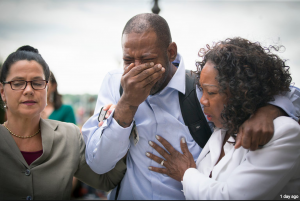CW: Discussion of police violence against people of color, problems of whiteness

I’ve seen a number of posts on social media in the last few days related to the acquittal of the police officer who shot Philandro Castille. Many of these posts contain comments from white people who indicate that they are shocked by this result.
There have been too many high-profile shootings of black men in this country in the last few years for white people to still be shocked when a police officer is inevitably acquitted. We must learn the hard truths of our communities that black and brown people have always known. We must use our eyes to see that this is a clear pattern of miscarriages of justice, not lone or isolated incidents.
What can we, as white people who read The Exponent blog, do?
First, we have to educate ourselves. Other communities have done this. It isn’t a graceful process. After the police shooting of Michael Brown, the protests in Ferguson, Missouri, and the arrive of #BlackLivesMatter, I realized that I couldn’t use my ignorance on the topic of race as an excuse any more. I had to commit myself to learning more.
When my friends posted about racism, I started reading the articles instead of ignoring them. I had previously thought that something as awful as racism surely didn’t apply to me (it totally did). If people in your social circle weren’t or aren’t posting about this important issue, here are a few links to get you started:
White Privilege: Unpacking the Invisible Knapsack by Peggy McIntosh
8 Facts About Race Every White Person Needs to Know to Help Fight Racism by Darnell Moore
Just Stop Talking About Race by Franchesca Ramesy (video)
Articles like these helped me to understand the basics. I knew that I had covered my bases with this intro-level material when I started to see the same ideas repeated.
While the content of these articles was straightforward and repeated in many different places, it was difficult to read – emotionally difficult. I had no idea that I’d built up such strong emotional defense mechanisms around race. In the early days of reading, I used to get a tight feeling in my throat or if I came across something that was surprising, I felt nauseous. These feelings were trying to signal me to stop engaging in this content. I worry that Mormons are trained to read discomfort as evidence of evil. I tried to recognize my physical responses for what they were (white fragility) and keep going. This got much easier with time as I realized that I could be uncomfortable and that nothing bad would happen to me as a result. Leaning into my own discomfort was a sign of learning. I still feel these feelings when learning and listening, but I can now quickly recognize that my discomfort means I need to stay engaged.
Every intro article says that if you want to over work on your own personal racism, you have to listen. I branched out and started reading long-form articles on racism and the experiences of people of color. I followed prominent people of color on Twitter and Facebook. I read Ta-Nehisi Coates and bell hooks. I committed to getting beyond an intro-level of understanding about race by listening.
I came to understand that learning was my job and that I shouldn’t burden people of color with lots of questions. I learned to google my questions. Google is pretty good for that.
I got to the stage where I started reviewing my interactions with people of color throughout my whole life. I started to understand that I had perpetrated micro-aggressions against others. I had to repent of this. The people I had hurt were no longer in my life, but I understood what I did. I committed to becoming more knowledgable and sensitive to these issues so that I would not repeat these mistakes. I later learned that this kind of learning process is full of making mistakes. Apologize, listen, learn, do better. If it helps you, pray for help in doing this.
I started to understand that my art history curriculum was full of white people. I changed that. I realized that my whole discipline was focused almost exclusively on white artists. It made me feel sick to my stomach. When raised this issue in a Facebook group for people who teach art history(typically very liberal), I received strong push back. I started to get it.
I started reading about whiteness and realized that this was at the heart of the problem (more on that in another post).
Now I am not shocked when white people commit acts of violence against people of color and get away with it. I can’t fix a broken system on my own, but I can support those who are working on systemic issues and I can fix/adjust/educate in my own areas of influence.
Dear God,
Let us remember the things we are always forgetting:
Charity for our neighbors who we pass in the street everyday
Who serve us, who we serve, who are part of our community;
Justice for those who are left behind by our broken systems
Who serve us, who we serve, who are part of our community;
Peace for those who use their bodies and voices for violence and harm
Who serve us, who we serve, who are part of our community;
Let us always remember our siblings in God
And work to make our communities remember them all.
Amen.






4 Responses
Thanks for this. I could echo much that you say–having a black brother in law, mixed nieces and nephews, and black nieces has also changed a lot of what I think and read and say and learn.
Question–its something I talk about in person quite often. But I have no idea how to navigate talking about racism/white fragility, etc. on Facebook, etc. do you post articles on social media? Do you write/share about prominent, heartbreaking, regularly occurring police acquittals? Would love to hear your thoughts.
I think that you should pursue whatever methods work best for you. If you can encourage white people into these conversations in person, go with that. If you can engage you friends in these conversations online, do that too.
Thanks for this, Nancy. I have a lot of learning to do.
Specifically re art history, I hope you have long since discovered medievalpoc? They are an amazing resource for POC in European art history.